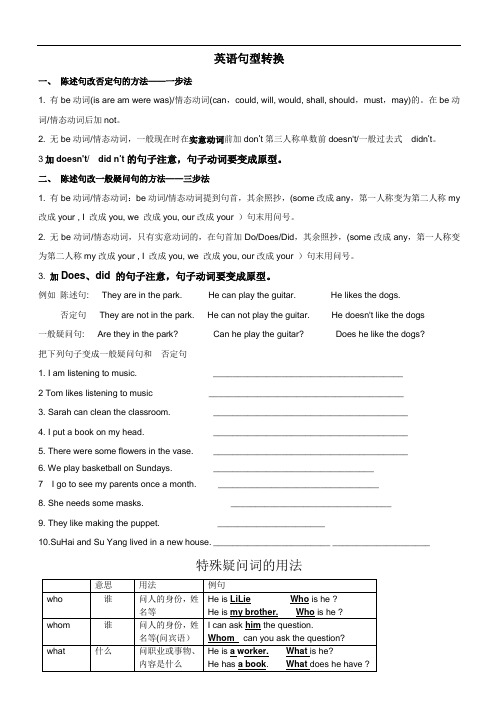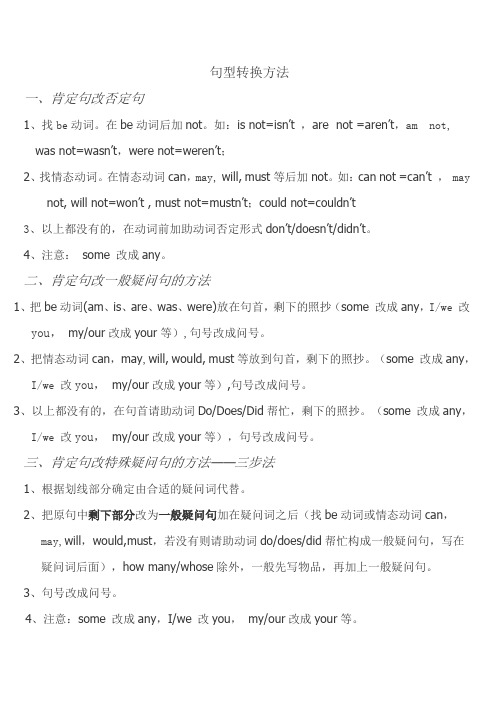句型转换
英语句子转换类型及方法

英语句子转换类型及方法
一、英语句子转换的类型
英语句子转换可以分为两种类型:句型转换和句式转换。
1. 句型转换
句型转换是指将一个句子的结构转换为另一种结构,但语义不发生变化。
句型转换可以分为以下几种:
(1) 主语和谓语的转换
例如:She reads books. -> Books are read by her.
(2) 宾语和谓语的转换
例如:He gives me a book. -> A book is given to me by him.
(3) 形容词和动词的转换
例如:The book is interesting. -> The book interests me.
2. 句式转换
句式转换是指将一个句子的结构和语义都转换为另一种结构和
语义。
句式转换可以分为以下几种:
(1) 肯定句和否定句的转换
例如:He likes apples. -> He doesn"t like apples.
(2) 疑问句和陈述句的转换
例如:Does he like apples? -> He likes apples.
(3) 陈述句和感叹句的转换
例如:He likes apples. -> How does he like apples?
二、英语句子转换的方法
英语句子转换的方法可以分为两种:语法转换和语义转换。
1. 语法转换
语法转换是指通过改变句子的语法结构来实现句子的转换。
句型转换50个

句型转换50个1. 原句:He is a good student.- 否定句:He isn't a good student.- 一般疑问句:Is he a good student?2. 原句:They play football every day.- 否定句:They don't play football every day.- 一般疑问句:Do they play football every day?3. 原句:She has a beautiful dress.- 否定句:She doesn't have a beautiful dress.- 一般疑问句:Does she have a beautiful dress?4. 原句:I like reading books.- 否定句:I don't like reading books.- 一般疑问句:Do you like reading books?5. 原句:There are some apples on the table.- 否定句:There aren't any apples on the table. - 一般疑问句:Are there any apples on the table?6. 原句:He can speak English well.- 否定句:He can't speak English well.- 一般疑问句:Can he speak English well?7. 原句:My mother made a cake yesterday.- 否定句:My mother didn't make a cake yesterday.- 一般疑问句:Did your mother make a cake yesterday?8. 原句:We will go to the park tomorrow.- 否定句:We won't go to the park tomorrow.- 一般疑问句:Will you go to the park tomorrow?9. 原句:The boy is running fast.- 否定句:The boy isn't running fast.- 一般疑问句:Is the boy running fast?10. 原句:She was at home last night.- 否定句:She wasn't at home last night.- 一般疑问句:Was she at home last night?11. 原句:They have been to Beijing.- 否定句:They haven't been to Beijing.- 一般疑问句:Have they been to Beijing?12. 原句:He had a great time at the party.- 否定句:He didn't have a great time at the party. - 一般疑问句:Did he have a great time at the party?13. 原句:I will be a teacher in the future.- 否定句:I won't be a teacher in the future.- 一般疑问句:Will you be a teacher in the future?14. 原句:There is a lot of water in the glass.- 否定句:There isn't a lot of water in the glass.- 一般疑问句:Is there a lot of water in the glass?15. 原句:She reads English every morning.- 否定句:She doesn't read English every morning.- 一般疑问句:Does she read English every morning?16. 原句:They are going to have a party this weekend.- 否定句:They aren't going to have a party this weekend. - 一般疑问句:Are they going to have a party this weekend?17. 原句:He does his homework carefully.- 否定句:He doesn't do his homework carefully.- 一般疑问句:Does he do his homework carefully?18. 原句:I saw a movie last week.- 否定句:I didn't see a movie last week.- 一般疑问句:Did you see a movie last week?19. 原句:We have a lot of homework to do.- 否定句:We don't have a lot of homework to do.- 一般疑问句:Do you have a lot of homework to do?20. 原句:The cat is sleeping under the tree.- 否定句:The cat isn't sleeping under the tree.- 一般疑问句:Is the cat sleeping under the tree?21. 原句:She will write a letter soon.- 否定句:She won't write a letter soon.- 一般疑问句:Will she write a letter soon?22. 原句:There were some people in the room.- 否定句:There weren't any people in the room.- 一般疑问句:Were there any people in the room?23. 原句:He has lived here for five years.- 否定句:He hasn't lived here for five years.- 一般疑问句:Has he lived here for five years?24. 原句:I am reading an interesting book.- 否定句:I'm not reading an interesting book.- 一般疑问句:Are you reading an interesting book?25. 原句:They played basketball yesterday afternoon.- 否定句:They didn't play basketball yesterday afternoon. - 一般疑问句:Did they play basketball yesterday afternoon?26. 原句:She can dance beautifully.- 否定句:She can't dance beautifully.- 一般疑问句:Can she dance beautifully?27. 原句:My father bought a new car last month.- 否定句:My father didn't buy a new car last month.- 一般疑问句:Did your father buy a new car last month?28. 原句:We are going to see a film tonight.- 否定句:We aren't going to see a film tonight.- 一般疑问句:Are you going to see a film tonight?29. 原句:There is some milk in the fridge.- 否定句:There isn't any milk in the fridge.- 一般疑问句:Is there any milk in the fridge?30. 原句:He likes playing the guitar.- 否定句:He doesn't like playing the guitar.- 一般疑问句:Does he like playing the guitar?31. 原句:I have finished my work.- 否定句:I haven't finished my work.- 一般疑问句:Have you finished your work?32. 原句:They were watching TV at eight o'clock last night.- 否定句:They weren't watching TV at eight o'clock last night. - 一般疑问句:Were they watching TV at eight o'clock last night?33. 原句:She will go shopping tomorrow.- 否定句:She won't go shopping tomorrow.- 一般疑问句:Will she go shopping tomorrow?34. 原句:There are five students in the classroom.- 否定句:There aren't five students in the classroom.- 一般疑问句:Are there five students in the classroom?35. 原句:He has a pet dog.- 否定句:He doesn't have a pet dog.- 一般疑问句:Does he have a pet dog?36. 原句:I am going to visit my grandparents this weekend.- 否定句:I'm not going to visit my grandparents this weekend.- 一般疑问句:Are you going to visit your grandparents this weekend?37. 原句:They have seen that movie.- 否定句:They haven't seen that movie.- 一般疑问句:Have they seen that movie?38. 原句:She was reading a novel when I came in.- 否定句:She wasn't reading a novel when I came in.- 一般疑问句:Was she reading a novel when you came in?39. 原句:He will be back soon.- 否定句:He won't be back soon.- 一般疑问句:Will he be back soon?40. 原句:There were some books on the desk.- 否定句:There weren't any books on the desk.- 一般疑问句:Were there any books on the desk?41. 原句:I can play the piano.- 否定句:I can't play the piano.- 一般疑问句:Can you play the piano?42. 原句:My mother cooks delicious food.- 否定句:My mother doesn't cook delicious food.- 一般疑问句:Does your mother cook delicious food?43. 原句:We had a party last weekend.- 否定句:We didn't have a party last weekend.- 一般疑问句:Did you have a party last weekend?44. 原句:She is going to sing a song at the concert.- 否定句:She isn't going to sing a song at the concert. - 一般疑问句:Is she going to sing a song at the concert?45. 原句:He has read this book twice.- 否定句:He hasn't read this book twice.- 一般疑问句:Has he read this book twice?46. 原句:I saw him in the park yesterday.- 否定句:I didn't see him in the park yesterday.- 一般疑问句:Did you see him in the park yesterday?47. 原句:They will build a new house next year.- 否定句:They won't build a new house next year.- 一般疑问句:Will they build a new house next year?48. 原句:There is a big tree in front of my house.- 否定句:There isn't a big tree in front of my house.- 一般疑问句:Is there a big tree in front of your house?49. 原句:She likes wearing skirts.- 否定句:She doesn't like wearing skirts.- 一般疑问句:Does she like wearing skirts?50. 原句:I am a doctor.- 否定句:I'm not a doctor.- 一般疑问句:Are you a doctor?。
句子的转换有多少种形式

句子的转换有多少种形式文章一:句子的转换有多少种形式?对于句子的转换,我们可以采用多种形式,通过不同的方法改变原有的句子结构,以达到表达更加准确、生动的效果。
下面列出三个知识点并进行分析。
1. 句型转换的目的与方法句子的转换是为了表达更加准确、复杂的含义,或者为了让同一种表达方式更加生动、具有表现力。
句型转换的方法主要有以下几种:(1)主动变被动:通过将原有句子中的主语变为被动语态的主语,来表达出被动的意义。
例如,“Tom opened the door”可以转换为“The door was opened by Tom”。
(2)疑问变陈述:通过将原有疑问句中的语气改为陈述句,来表达出强烈的肯定或否定的意义。
例如,“Do you like pizza?”可以转换为“I like pizza”。
(3)倒装句:通过将原有句子中的谓语动词与主语倒置,来表达出强调、反问等意义。
例如,“I have never seen such a beautiful girl”可以转换为“Never have I seen such a beautiful girl”。
2. 句型转换的适用场景句型转换的适用场景主要有以下几种:(1)表达强调:通过强调某个词语或句子成分,来表达出强烈的情感或意义。
例如,“I didn't say you were crazy”可以通过倒装句,强调“you were crazy”,以表达出强烈的否定意义。
(2)表达比较:通过将原有句子中的成分进行比较,来表达出事物之间的差异或相似之处。
例如,“I like coffee more than tea”可以转换为“Tea is not as good as coffee”,以表达出两种饮料之间的比较。
(3)表达变化:通过改变句子中的时态、语态等成分,来表达出事物的变化趋势或发展方向。
例如,“He has been studying English for three years”可以转换为“He started studying English three years ago”,以表达出他学习英语的起点和变化趋势。
句型转换

英语句型转换一、 陈述句改否定句的方法——一步法 1. 有 be 动词(is are am were was)/情态动词(can,could, will, would, shall, should,must,may)的。
在 be 动 词/情态动词后加 not。
2. 无 be 动词/情态动词,一般现在时在实意动词前加 don’t 第三人称单数前 doesn't/一般过去式 didn’t。
3 加 doesn't/ did n’t 的句子注意,句子动词要变成原型。
二、 陈述句改一般疑问句的方法——三步法 1. 有 be 动词/情态动词:be 动词/情态动词提到句首,其余照抄,(some 改成 any,第一人称变为第二人称 my 改成 your , I 改成 you, we 改成 you, our 改成 your )句末用问号。
2. 无 be 动词/情态动词,只有实意动词的,在句首加 Do/Does/Did,其余照抄,(some 改成 any,第一人称变 为第二人称 my 改成 your , I 改成 you, we 改成 you, our 改成 your )句末用问号。
3. 加 Does、did 的句子注意,句子动词要变成原型。
例如 陈述句: 否定句 一般疑问句: They are in the park. They are not in the park. Are they in the park? He can play the guitar. He can not play the guitar. Can he play the guitar? He likes the dogs. He doesn't like the dogs Does he like the dogs?把下列句子变成一般疑问句和 否定句 1. I am listening to music. 2 Tom likes listening to music 3. Sarah can clean the classroom. 4. I put a book on my head. 5. There were some flowers in the vase. 6. We play basketball on Sundays. 7 I go to see my parents once a month. 8. She needs some masks. 9. They like making the puppet. _______________________________________ ________________________________________ ________________________________________ ________________________________________ ________________________________________ _________________________________ _________________________________ _________________________________ ______________________10.SuHai and Su Yang lived in a new house. ________________________ ____________________特殊疑问词的用法意思 who whom what 谁 谁 什么 用法 问人的身份,姓 名等 问人的身份,姓 名等(问宾语) 例句 He is LiLie He is my brother. Who is he ? Who is he ?I can ask him the question. Whom can you ask the question? What is he? What does he have ?问职业或事物、 He is a worker. 内容是什么 He has a book.which哪一个问一定范围内 特指的人或物 问所属关系The big box is mine. Which box is yours? The girl at the door is Ann. Which girl is Ann? This is her book. Whose book is this ? This book is hers. Whose is this book?whose what color What time when where why how谁的 什么颜色 几点 什么时候 什么地方 为什么 怎样问颜色(表语) My skirt is red. What color is your skirt? 问具体时间 问大致时间 We play games at five in the afternoon ? What time do you play games? We play games in the afternoon ? When do you play games?问地点(状语) We play games at home on Sunday ? Where do you play games on Sunday? 问原因 问健康状况、 做事的方式等 问年龄 跟复数名词, 问数量 跟不可数名词 问数量或价钱 问路程 问 in+一段时间 问一段时间, 问物体的长短 He isn't at school today because he is ill. Why isn't he at school today ? He is fine/strong. How is he ? I go home by bike. How do you go home? He is ten. How old is he ? There are thirty boys in my class. How many boys are there in your class? There is some milk in the bottle. How much milk is there in the bottle? It's five kilometers away from here? How far is it from here? He can finish it in half an hour. How soon can he finish it ? He has lived here for a year. How long has he lived here? The desk is one meters long. How long is the desk ? I go to see my parents once a month. How often do you go to see your parents?how old how many how much how far how soon how long多大几岁 多少 多少 多远 多快,多 久 多久how often多久 (一次)问频率How 的疑问句辨析 一、how many 和 how much 的区别 how many 用来询问可数名词的数量,它的句式是:How many+复数名词+一般疑问句+? how much 用来询问不可数名词的数量,也可询问价格。
句型转换规则归纳

句型转换规则归纳-CAL-FENGHAI.-(YICAI)-Company One1句型转换规则归纳1.含有be动词(am, is, are)的句子,改为否定句是在be动词后面加not,原来句子中的some改为any; 改为一般疑问句的时候,将be动词直接放到句子的最前面,原来句子中的some改为any,句号改为问号。
((如果主语是第一人称则变成第二人称))1)There is a house in the forest. (肯定句)There is not a house in the forest. (否定句) is not=isn’tIs there a house in the forest(一般疑问句)2)There are some classrooms in the school. (肯定句)There are not any classrooms in the school. (否定句) are not=aren’tAre there any classrooms in the school(一般疑问句)3) I am a new student. (肯定句)I am not a new student. (否定句) am not没有缩写形式Are you a new student (一般疑问句)(主语是第一人称I时,改为一般疑问句时主语要变为第二人称you)2.含有情态动词如:can, may ,must, would,should ,could, will 的句子,改否定句时直接在情态动词后面加not, 原来句子中的some改为any; 改为一般疑问句的时候,将情态动词直接放到句子的最前面,原来句子中的some改为an y,句号改为问号。
((如果主语是第一人称则变成第二人称))1)I can play basketball. (肯定句)I can not play basketball. (否定句) can not = can’tCan you play basketball(一般疑问句)3.不含有be动词,也没有情态动词的句子,改为否定句的时候需要借助助动词don’t和doesn’t来否定,原来句子中的some改为any; 改为一般疑问句的时候需要借助Do, Does来提问,原来句子中的some改为any,句号改问号。
句型转换方法

句型转换方法一、肯定句改否定句1、找be动词。
在be动词后加not。
如:is not=isn’t ,are not =aren’t,am not,was not=wasn’t,were not=weren’t;2、找情态动词。
在情态动词can,may, will, must等后加not。
如:can not =can’t ,maynot, will not=won’t , must not=mustn’t;could not=couldn’t3、以上都没有的,在动词前加助动词否定形式don’t/doesn’t/didn’t。
4、注意:some 改成any。
二、肯定句改一般疑问句的方法1、把be动词(am、is、are、was、were)放在句首,剩下的照抄(some 改成any,I/we 改you,my/our改成your等),句号改成问号。
2、把情态动词can,may,will, would, must等放到句首,剩下的照抄。
(some 改成any,I/we 改you,my/our改成your等),句号改成问号。
3、以上都没有的,在句首请助动词Do/Does/Did帮忙,剩下的照抄。
(some 改成any,I/we 改you,my/our改成your等),句号改成问号。
三、肯定句改特殊疑问句的方法——三步法1、根据划线部分确定由合适的疑问词代替。
2、把原句中剩下部分改为一般疑问句加在疑问词之后(找be动词或情态动词can,may,will,would,must,若没有则请助动词do/does/did帮忙构成一般疑问句,写在疑问词后面),how many/whose除外,一般先写物品,再加上一般疑问句。
3、句号改成问号。
4、注意:some 改成any,I/we 改you,my/our改成your等。
句子的句型转换

句子的句型转换句子的句型转换是英语语法中非常重要的一部分,通过改变句子的结构和句型,可以使句子更加丰富多样,增加表达的灵活性。
本文将从基本句型转换、主动语态和被动语态转换、定语从句转换以及条件句转换等几个方面来探讨句子句型的转换方法。
一、基本句型转换1. 肯定句转否定句肯定句结构为主语+谓语,将其转换为否定句,可以在谓语前加上否定副词或情态动词not。
例如:He is a teacher.(他是一位老师。
)He is not a teacher.(他不是一位老师。
)2. 否定句转肯定句否定句转肯定句可以将否定副词或情态动词not去掉。
例如:He is not a teacher.(他不是一位老师。
)He is a teacher.(他是一位老师。
)3. 一般疑问句转否定句一般疑问句转否定句可以将be动词和主语的位置交换,并在be动词后加上not。
例如:Is she a doctor?(她是医生吗?)She is not a doctor.(她不是医生。
)4. 陈述句转一般疑问句陈述句转一般疑问句可以将陈述句的主语和谓语的位置交换。
例如:You are a student.(你是学生。
)Are you a student?(你是学生吗?)5. 特殊疑问句转陈述句特殊疑问句转陈述句可以将特殊疑问词替换为对应的陈述词。
例如:Where is the library?(图书馆在哪里?)The library is over there.(图书馆在那边。
)二、主动语态和被动语态转换1. 主动语态转被动语态主动语态转被动语态的一般形式为:主语+谓语+宾语→ 宾语+be动词+过去分词+by+主语。
例如:They built a new bridge.(他们修建了一座新桥。
)A new bridge was built by them.(一座新桥被他们修建了。
)2. 被动语态转主动语态被动语态转主动语态的一般形式为:宾语+be动词+过去分词+by+主语→ 主语+谓语+宾语。
句型转换ppt课件

在句型转换时,应根据语境和表达需求选择适当的转换方式,如主动句变被动句、肯定句变否定句等 。通过灵活运用不同的转换方式,可以使句子更加丰富多样,增强语言的表现力。
注意句子语序的调整
总结词
在句型转换过程中,语序的调整是一个重要 的技巧。
详细描述
由于中文的语法结构与英语不同,在进行句 型转换时,需要注意语序的调整。通过合理 安排词语的顺序,可以更好地表达句子的意 思,并使句子更加符合中文的表达习惯。在 进行语序调整时,可以参考中文的语法规则 和习惯用法,以确保转换后的句子语序正确 、流畅自然。
示例
将“The cat sat on the mat.” 的主语转换为“A cat sat on a mat.”
谓语转换
谓语转换
改变原句的谓语动词,以表达不同的 语气或强调不同的重点。
示例
将“The dog chased the ball.”的谓 语转换为“The ball was chased by the dog.”
主语错误
主语缺失
主语与谓语搭配不当
在句子中没有明确的主语,导致句子 结构不完整。
主语和谓语之间缺乏逻辑关系或语义 联系。
主语错位
主语的位置不正确,导致句子意思表 达不清。
谓语错误
谓语缺失
句子中缺少谓语,导致句子结构不完整。
谓语错位
谓语的位置不正确,导致句子意思表达不清。
谓语与宾语搭配不当
谓语和宾语之间缺乏逻辑关系或语义联系。
句型转换ppt课件
目 录
• 句型转换简介 • 简单句型转换 • 复合句型转换 • 句型转换技巧 • 句型转换练习 • 句型转换常见错误与纠正
01
句型转换简介
- 1、下载文档前请自行甄别文档内容的完整性,平台不提供额外的编辑、内容补充、找答案等附加服务。
- 2、"仅部分预览"的文档,不可在线预览部分如存在完整性等问题,可反馈申请退款(可完整预览的文档不适用该条件!)。
- 3、如文档侵犯您的权益,请联系客服反馈,我们会尽快为您处理(人工客服工作时间:9:00-18:30)。
英语所有句型转换的方法
1、句中含有am,is,are,的,将am,is,are,移位到句首,构成疑问句。
在am,is,are后面加not构成否定句
2、划线部分提问:句中不能出现划线部分,但将划线部分转成疑问词.
将陈述句变成祈使句
将陈述句变成疑问句
一般疑问句,
就是将一般疑问词提到句首。
没有一般疑问次(amisare)就加上助动词放在句首。
然后句子中间注意要改变的地方。
比如说,如果是一句以第三人称来写的陈述句。
那一些动词后面会加上es。
如果要改成一般疑问句,
句子里面又必须将助动词does(第三人称单数)放在句首作一般疑问句的话,那改变的时候,动词后面就必须去es。
然后就是some和any的事情,
陈述句用some,
一般疑问句用any。
但是一小部分一般疑问句里面,
看到some,
一般疑问句也是要改some的。
在这句句子是……
比如说想要什么东西,
一般疑问句里面就要用some。
还有一种是特殊疑问句,
题目一般是划线提问。
根据划线的词语选用特殊疑问词,
放在句首,
进行提问。
特殊疑问词一般是w或wh开头的。
如:
what\how\who\howmany\howmuch\whatcolour\
howold\which\why……
等等……
小学里面疑问句最主要的就是这些了。
回答者:yyxyp-见习魔法师二级8-2512:54
古人云"授人鱼,不如授人渔。
"古人尚且知道授人知识不如授人方法的道理,那么在各种理论高度发展的今天为什么就不能多重视一点方法和传授呢?句子教学是英语教学中的重要环节,有了句子作为基础,学生才能学好英语,也才能真正运用英语。
在几年的英语教学中,我总结了一些英语句子教学的小窍门,现简单归纳如下:
一、肯定句改否定句的方法--一步法
1、在be动词后加not。
如:isnot,arenot,amnot,wasnot,werenot;
2、在can,should,will等后加not。
如:cannot,shouldnot,willnot;
3、上述都没有的,在动词前加助动词否定形式don't/doesn't/didn't。
4、some改成any。
二、肯定句改一般疑问句的方法--三步法
1、把be动词放在句首,剩下的照抄,(some改成any,my改成your等)句点改成问号。
2、把can,shall,will等放到句首,剩下的照抄,(some改成any,my改成your等)句点改成问号。
3、上述都没有的,在句首请助动词Do/Does/Did帮忙,剩下的照抄,(some改成any,my改成your等)句点改成问号。
三、肯定句改特殊疑问句的方法--四步法
1、在一般疑问句的基础上,句首添加一个疑问词即可,可根据划线部分确定是什么疑问词。
2、接着找be动词或can,shall,will等放在疑问词后面,若没有则请助动词do/does/did 帮忙,写在疑问词后面,howmany除外,必须先写物品,再写be动词等。
3、划线部分去掉后剩下的内容照抄,(some改成any,my改成your等)
4、句点改成问号。
总之,要教好句子,首先要给学生渗透句子的纲,学生才可以依葫芦画瓢,有纲可循。
当然,平时还必须增加阅读量,实践量,不断总结经验,培养语感掌握技巧,提高句子的准确性。
句型转换复习指导
中考的句型转换题主要考查学生对句子结构的构成、变化等方面的知识及对该知识的运用能力。
此类考题首先给出一个完整的句子,再给出一个含有几个空白处的句子,让考生根据不同的要求填入适当的词来完成句型转换。
句型转换题涉及到的语法知识较多,在做题时,同学们应注意时态、语态、人称数的变化和特殊疑问词的用法,以及助动词的用法等。
句型转换题虽然包括各种句式,但在中考中主要以两种形式为主进行考查:同义型句型转换和条件型句型转换。
一、同义型句型转换
同义型句型转换,是用另一种方式来表述与原句相同的句意,也称作同义句转换。
主要考查学生对句型及词汇的掌握情况。
【真题再现】
1.Ipreferwalkingtheretogoingbybus.
Iprefertowalkthere__________________bybus.
该题考查prefer…to…与prefer…ratherthan…这两个句型的转换。
前者后接动词时用V-ing形式,而后者则接不定式,并且ratherthan后的不定符号要省去。
答案:ratherthango
2.IttookMarytwoweekstopreparefortheexam.
Mary______twoweeks____________fortheexam.
该题考查表示"花费时间做某事"的两个句型的转换,take常用的句型是:Ittake+时间+todo…;而spend却是:sb+spend+时间+(in)doing…。
答案:spent,inpreparing
3.Ididn'tdrawsowellashe.
He____________thanI.
题中上句意思为"我没有他画得好",换用另外一种说法是"他比我画得好"。
故句型"A+谓语+notas/so+形容词/副词的原级+asB"可转换为"B+谓语+形容词/副词的比较级+A"。
答案:drewbetter
4.Ialwaysgetupbeforesixo'clockinmyschooldays.
I______getup______sixo'clockinmyschooldays.
根据原句的意思,只有在第二句的两个空白处分别填入never与after,才能表达出与第一句相同的意思。
这里要注意always的否定副词是never。
答案:never,after
5.MybosstookaplanetotheUKthreedaysago.
Threedaysago,myboss_________theUK.
题中上下两句对比后,需要改写的部分只有词组tookaplane,相同含义的词有flyto…,gobyair(plane)。
另外注意上句与下句在时态上要一致。
答案:flewto
6.Thechildrenaretootiredtowalkfarther.
Theyare______tired______they______walkfarther.
含有too…to的简单句常和so…that引导的复合句互相转换。
但是t oo…to的本身是否定意义。
so…that从句要改为否定。
答案:so,that,can't
7.Thegirlleftherhomeafewdaysago,shehasnotcomebackyet.
Thegirlhas____________fromherhomeforafewdays.
题中上句意思为"女孩几天前离开家,现在还未回来"。
根据句意可知应用现在完成时。
forafewdays表示一段时间,在完成时中只能与延续性动词搭配,而leave是非延续性动词。
答案:beenaway
二、条件型句型转换
条件型句型转换,要求根据句子后给出的具体要求变换句型。
具体考查内容为:
1.单数句、复数句之间的转换;
2.肯定句、否定句、疑问句之间的转换;
3.简单句、并列句、复合句之间的转换;
4.陈述句、感叹句、祈使句之间的转换;
5.主动语态、被动语态之间的转换。
【真题再现】
1.It'srainingveryheavily.(改写为感叹句)
____________itisraining!
本句感叹的是副词heavily,所以要用how,原句中的very应去掉,还应注意句子开头的首字母要大写。
答案:Howheavily
2.Theyhavepaintedtheirnewhouse.(改为被动语态)
Theirnewhouse__________________bythem.
原句是现在完成时态,被动结构要用havebeendone。
在主动变被动时,特别要注意被动语态句主语的人称数的变化,这句被动句的主语是第三人称单数,要用has。
答案:hasbeenpainted
3.Therearesomeoldsheeponthefarm.(改为单数句)
Thereis______old______onthefarm.
sheep的单复数形式一样,old是元音开头的词,故冠词不能用a。
单数句与复数句转换时,名词、代词要一一对应互换。
注意名词变复数的规律,同时注意主谓的一致性。
答案:an,sheep
4.Hesetthealarmclockforseven.(改为一般疑问句)
______he______thealarmclockforseven?。
